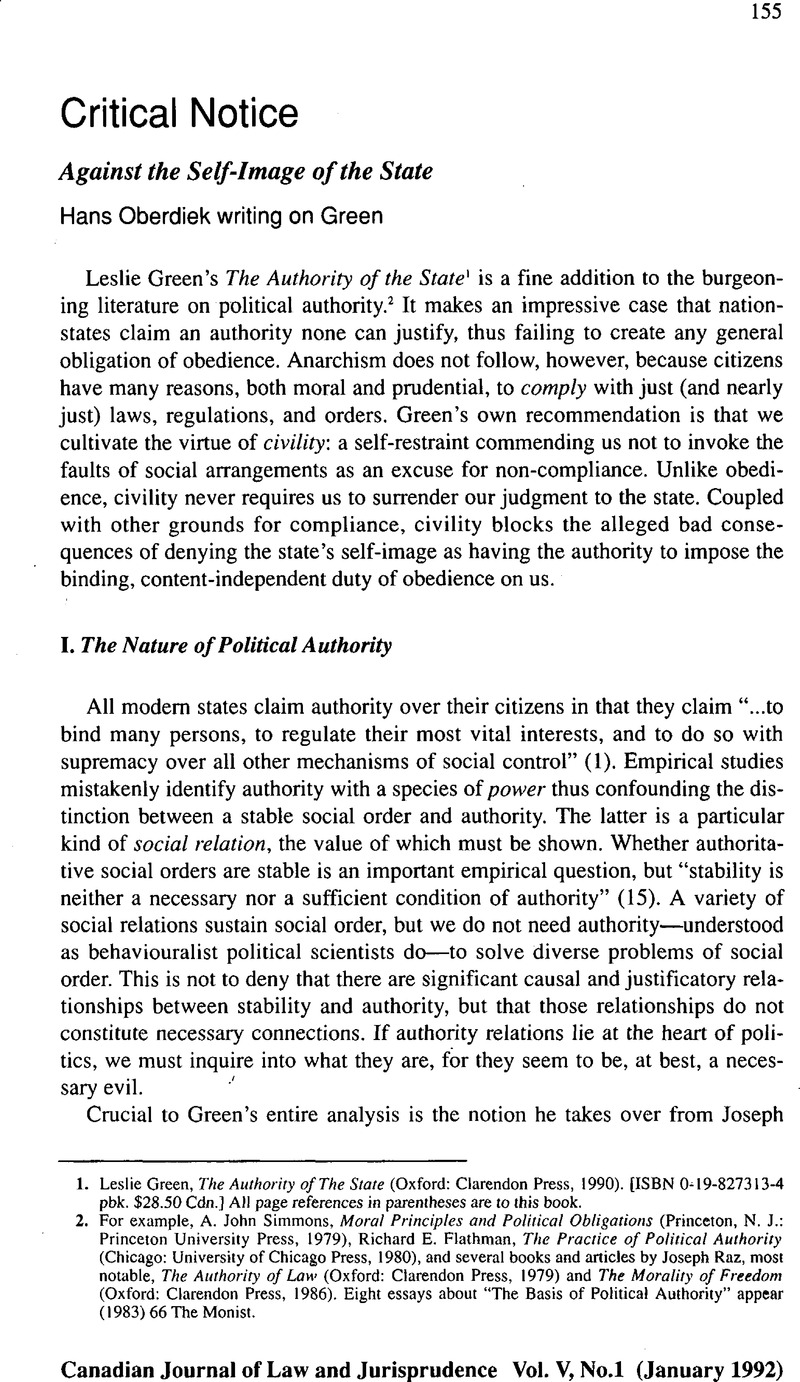No CrossRef data available.
Published online by Cambridge University Press: 09 June 2015

1. Leslie Green, The Authority of The State (Oxford: Clarendon Press, 1990).Google Scholar(ISBN 0-19-827313-4 pbk. $28.50 Cdn.] All page references in parentheses are to this book.
2. For example,John Simmons, A. Moral Principles and Political Obligations (Princeton, N. J.: Princeton University Press, 1979),Google Scholar RichardFlathman, E. The Practice of Political Authority (Chicago: University of Chicago Press, 1980),Google Scholar and several books and articles byRaz, Joseph most notable, The Authority of Law (Oxford: Clarendon Press, 1979)Google Scholar and andThe Morality of Freedom (Oxford: Clarendon Press 1986). Eight essays about “The Basis of Political Authority” appear (1983) 66TheMonist.Google Scholar
3. See Raz, Joseph Practical Reason and Norms (London: Hutchinson, 1975).Google ScholarSee also his his “Reasons for Action, Decisions and Norms,” (1975) lxxxiv Mind 481 and “Permission and Supererogation,” (1975) xii American Philosophical Quarterly 161.
4. See Ronald Dworkin’s discussion of Riggs v. Palmer [115 N. Y. 506, 22 N E. 188 (1889)] in Taking Rights Seriously (Cambridge, Mass.: Harvard University Press, 1977) at 23ff.Google Scholar
5. The late Alan Donagan is an example of someone who is indeed committed to the existence of an absolute exclusionary reason, for he holds that it is never permissible to violate the Pauline injunction never to do evil so that good may come. See his The Theory of Morality (Chicago: University of Chicago Press, 1978) c. 5.Google ScholarPubMed
6. Wolff, R.P. In Defense of Anarchism 2nd ed. (New York: Harper and Row, 1976) at 46.Google Scholar
7. Hegel, G.W.F. The Philosophy of Right trans. Knox, T.M. (Oxford: Clarendon Press, 1958). §5 at 22.Google Scholar
8. Winch, P. “Authority,” in A. Quinton, ed., Political Philosophy (Oxford: Oxford University Press, 1967) at 101.Google Scholar
9. Finnis, J. Natural Law and Natural Rights (Oxford: Clarendon Press, 1980) at 232.Google Scholar
10. Singer, P. Democracy and Disobedience (New York: Oxford University Press, 1974) at 50.Google Scholar
11. Taylor, C. “Atomism,” A. Kontos, ed., Powers, Possessions and Freedom (Toronto: University of Toronto Press, 1979) at 39–61.Google Scholar
12. Bradley, F.H. Ethical Studies, 2nd ed. (Oxford: Oxford University Press, 1962) at 176.Google Scholar
13. This argument is made bySandel, M.J. against Rawls in Liberalism and the Limits of Justice (Cambridge: Cambridge University Press, 1982) at 59–65.Google Scholar
14. Green, T.H. Lectures on the Principles of Political Obliga (London: Longmans, Green, and Co., 1950) at 122.Google Scholar
15. This objection is attributed toHonoré, A.M. “Must We Obey? Necessity as a Ground of Obligation,” 1981) 67 Virginia Law Review 39.Google Scholar
16. Rawls, J. A Theory of Justice (Cambridge, Mass.: .: Harvard University Press, 1971) at 355.Google Scholar
17. Richard Flathman makes much of these ways in The Practice of Authority, supra, note 2, c. 13.